Legal Analysis of Corporate Law Issues in Seedy Vineyards and Organic Wines Pty Ltd
VerifiedAdded on 2023/06/07
|9
|2993
|498
AI Summary
This legal analysis discusses the major concerns in Seedy Vineyards and Organic Wines Pty Ltd, including breach of directors' duties, transfer of shares, and company constitution. The analysis provides a detailed rule and analysis of the relevant sections of the Corporations Act 2001 and relevant case law. The analysis also provides a decision on the issues discussed. The subject is corporate law and the course code is not mentioned. The college/university is not mentioned.
Contribute Materials
Your contribution can guide someone’s learning journey. Share your
documents today.
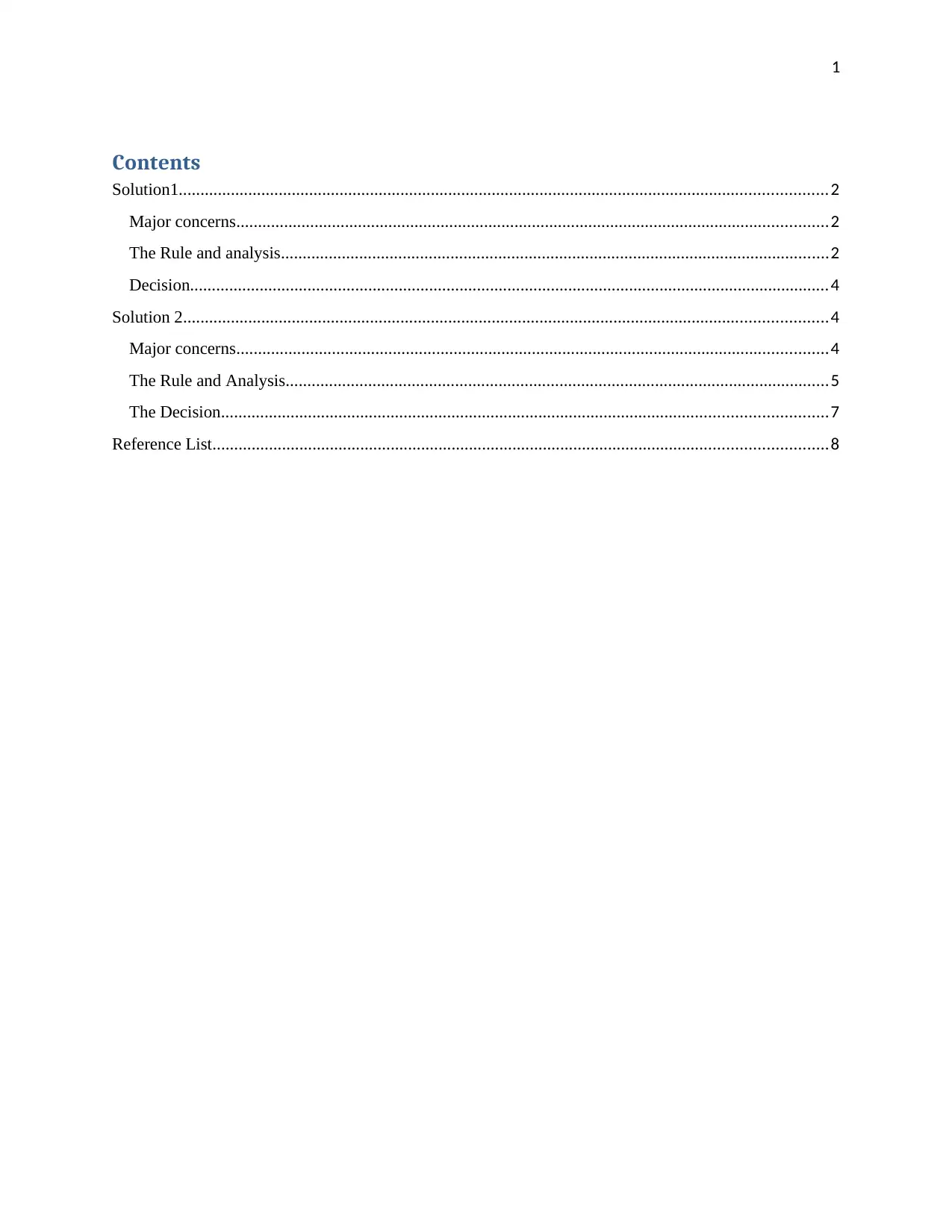
1
Contents
Solution1.....................................................................................................................................................2
Major concerns........................................................................................................................................2
The Rule and analysis..............................................................................................................................2
Decision...................................................................................................................................................4
Solution 2....................................................................................................................................................4
Major concerns........................................................................................................................................4
The Rule and Analysis.............................................................................................................................5
The Decision...........................................................................................................................................7
Reference List.............................................................................................................................................8
Contents
Solution1.....................................................................................................................................................2
Major concerns........................................................................................................................................2
The Rule and analysis..............................................................................................................................2
Decision...................................................................................................................................................4
Solution 2....................................................................................................................................................4
Major concerns........................................................................................................................................4
The Rule and Analysis.............................................................................................................................5
The Decision...........................................................................................................................................7
Reference List.............................................................................................................................................8
Secure Best Marks with AI Grader
Need help grading? Try our AI Grader for instant feedback on your assignments.
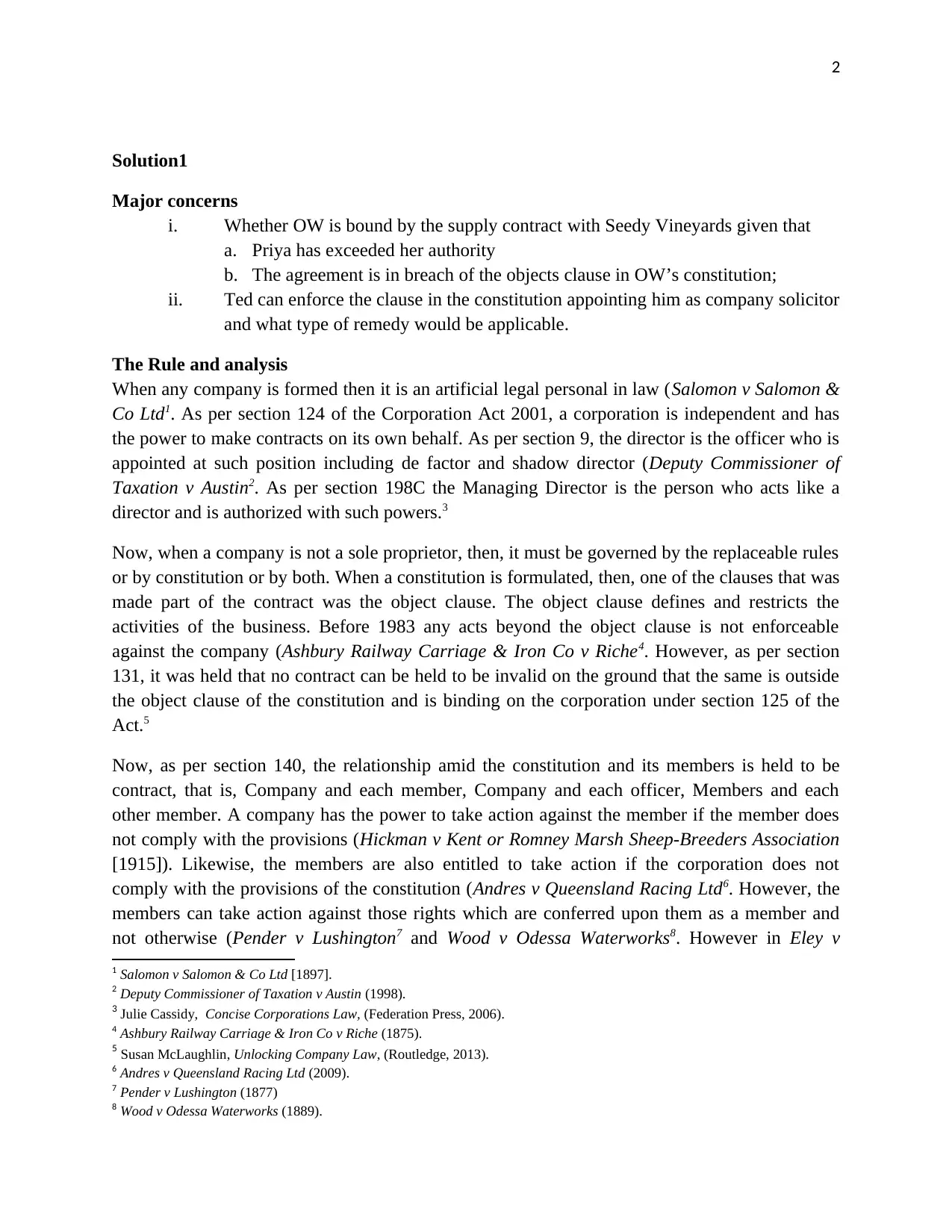
2
Solution1
Major concerns
i. Whether OW is bound by the supply contract with Seedy Vineyards given that
a. Priya has exceeded her authority
b. The agreement is in breach of the objects clause in OW’s constitution;
ii. Ted can enforce the clause in the constitution appointing him as company solicitor
and what type of remedy would be applicable.
The Rule and analysis
When any company is formed then it is an artificial legal personal in law (Salomon v Salomon &
Co Ltd1. As per section 124 of the Corporation Act 2001, a corporation is independent and has
the power to make contracts on its own behalf. As per section 9, the director is the officer who is
appointed at such position including de factor and shadow director (Deputy Commissioner of
Taxation v Austin2. As per section 198C the Managing Director is the person who acts like a
director and is authorized with such powers.3
Now, when a company is not a sole proprietor, then, it must be governed by the replaceable rules
or by constitution or by both. When a constitution is formulated, then, one of the clauses that was
made part of the contract was the object clause. The object clause defines and restricts the
activities of the business. Before 1983 any acts beyond the object clause is not enforceable
against the company (Ashbury Railway Carriage & Iron Co v Riche4. However, as per section
131, it was held that no contract can be held to be invalid on the ground that the same is outside
the object clause of the constitution and is binding on the corporation under section 125 of the
Act.5
Now, as per section 140, the relationship amid the constitution and its members is held to be
contract, that is, Company and each member, Company and each officer, Members and each
other member. A company has the power to take action against the member if the member does
not comply with the provisions (Hickman v Kent or Romney Marsh Sheep-Breeders Association
[1915]). Likewise, the members are also entitled to take action if the corporation does not
comply with the provisions of the constitution (Andres v Queensland Racing Ltd6. However, the
members can take action against those rights which are conferred upon them as a member and
not otherwise (Pender v Lushington7 and Wood v Odessa Waterworks8. However in Eley v
1 Salomon v Salomon & Co Ltd [1897].
2 Deputy Commissioner of Taxation v Austin (1998).
3 Julie Cassidy, Concise Corporations Law, (Federation Press, 2006).
4 Ashbury Railway Carriage & Iron Co v Riche (1875).
5 Susan McLaughlin, Unlocking Company Law, (Routledge, 2013).
6 Andres v Queensland Racing Ltd (2009).
7 Pender v Lushington (1877)
8 Wood v Odessa Waterworks (1889).
Solution1
Major concerns
i. Whether OW is bound by the supply contract with Seedy Vineyards given that
a. Priya has exceeded her authority
b. The agreement is in breach of the objects clause in OW’s constitution;
ii. Ted can enforce the clause in the constitution appointing him as company solicitor
and what type of remedy would be applicable.
The Rule and analysis
When any company is formed then it is an artificial legal personal in law (Salomon v Salomon &
Co Ltd1. As per section 124 of the Corporation Act 2001, a corporation is independent and has
the power to make contracts on its own behalf. As per section 9, the director is the officer who is
appointed at such position including de factor and shadow director (Deputy Commissioner of
Taxation v Austin2. As per section 198C the Managing Director is the person who acts like a
director and is authorized with such powers.3
Now, when a company is not a sole proprietor, then, it must be governed by the replaceable rules
or by constitution or by both. When a constitution is formulated, then, one of the clauses that was
made part of the contract was the object clause. The object clause defines and restricts the
activities of the business. Before 1983 any acts beyond the object clause is not enforceable
against the company (Ashbury Railway Carriage & Iron Co v Riche4. However, as per section
131, it was held that no contract can be held to be invalid on the ground that the same is outside
the object clause of the constitution and is binding on the corporation under section 125 of the
Act.5
Now, as per section 140, the relationship amid the constitution and its members is held to be
contract, that is, Company and each member, Company and each officer, Members and each
other member. A company has the power to take action against the member if the member does
not comply with the provisions (Hickman v Kent or Romney Marsh Sheep-Breeders Association
[1915]). Likewise, the members are also entitled to take action if the corporation does not
comply with the provisions of the constitution (Andres v Queensland Racing Ltd6. However, the
members can take action against those rights which are conferred upon them as a member and
not otherwise (Pender v Lushington7 and Wood v Odessa Waterworks8. However in Eley v
1 Salomon v Salomon & Co Ltd [1897].
2 Deputy Commissioner of Taxation v Austin (1998).
3 Julie Cassidy, Concise Corporations Law, (Federation Press, 2006).
4 Ashbury Railway Carriage & Iron Co v Riche (1875).
5 Susan McLaughlin, Unlocking Company Law, (Routledge, 2013).
6 Andres v Queensland Racing Ltd (2009).
7 Pender v Lushington (1877)
8 Wood v Odessa Waterworks (1889).
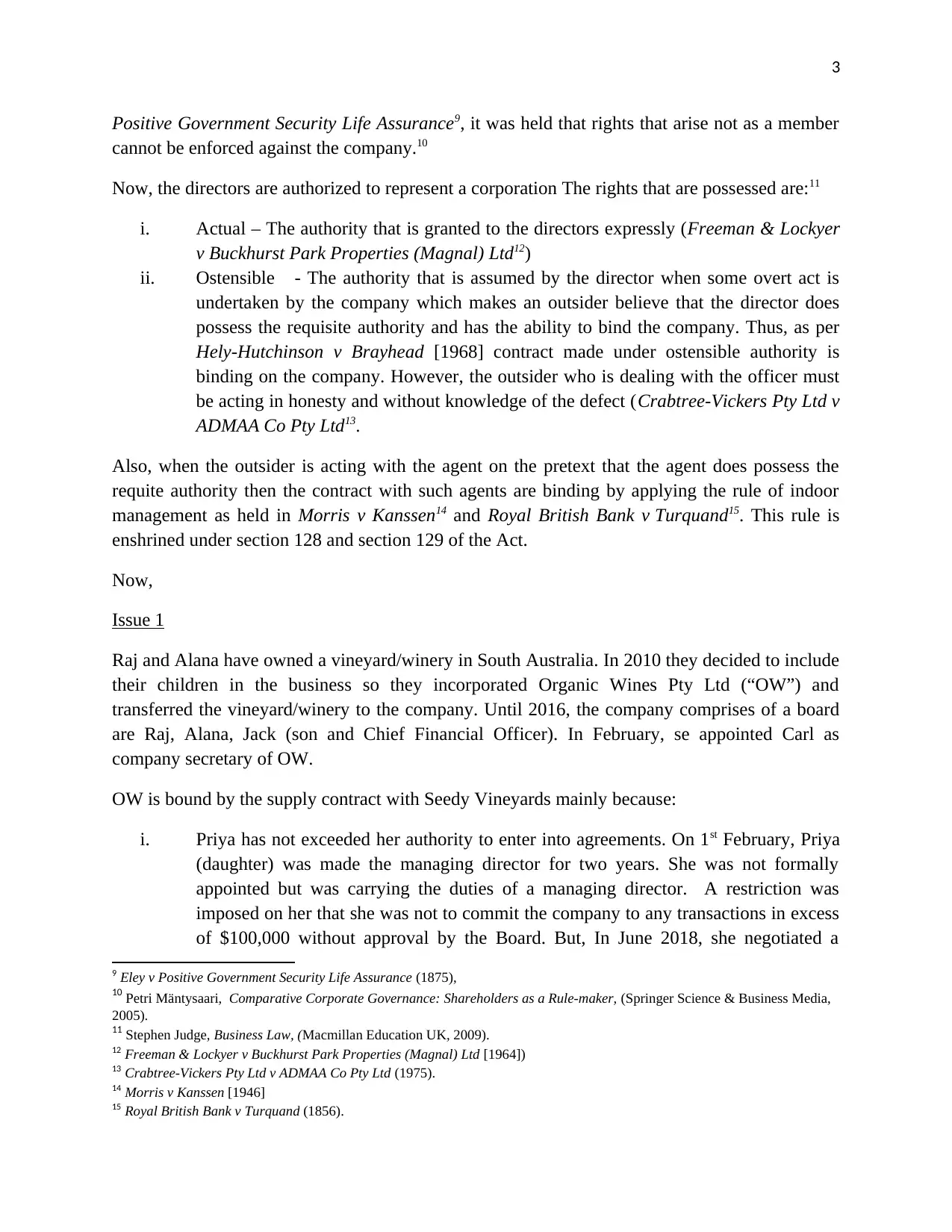
3
Positive Government Security Life Assurance9, it was held that rights that arise not as a member
cannot be enforced against the company.10
Now, the directors are authorized to represent a corporation The rights that are possessed are:11
i. Actual – The authority that is granted to the directors expressly (Freeman & Lockyer
v Buckhurst Park Properties (Magnal) Ltd12)
ii. Ostensible - The authority that is assumed by the director when some overt act is
undertaken by the company which makes an outsider believe that the director does
possess the requisite authority and has the ability to bind the company. Thus, as per
Hely-Hutchinson v Brayhead [1968] contract made under ostensible authority is
binding on the company. However, the outsider who is dealing with the officer must
be acting in honesty and without knowledge of the defect (Crabtree-Vickers Pty Ltd v
ADMAA Co Pty Ltd13.
Also, when the outsider is acting with the agent on the pretext that the agent does possess the
requite authority then the contract with such agents are binding by applying the rule of indoor
management as held in Morris v Kanssen14 and Royal British Bank v Turquand15. This rule is
enshrined under section 128 and section 129 of the Act.
Now,
Issue 1
Raj and Alana have owned a vineyard/winery in South Australia. In 2010 they decided to include
their children in the business so they incorporated Organic Wines Pty Ltd (“OW”) and
transferred the vineyard/winery to the company. Until 2016, the company comprises of a board
are Raj, Alana, Jack (son and Chief Financial Officer). In February, se appointed Carl as
company secretary of OW.
OW is bound by the supply contract with Seedy Vineyards mainly because:
i. Priya has not exceeded her authority to enter into agreements. On 1st February, Priya
(daughter) was made the managing director for two years. She was not formally
appointed but was carrying the duties of a managing director. A restriction was
imposed on her that she was not to commit the company to any transactions in excess
of $100,000 without approval by the Board. But, In June 2018, she negotiated a
9 Eley v Positive Government Security Life Assurance (1875),
10 Petri Mäntysaari, Comparative Corporate Governance: Shareholders as a Rule-maker, (Springer Science & Business Media,
2005).
11 Stephen Judge, Business Law, (Macmillan Education UK, 2009).
12 Freeman & Lockyer v Buckhurst Park Properties (Magnal) Ltd [1964])
13 Crabtree-Vickers Pty Ltd v ADMAA Co Pty Ltd (1975).
14 Morris v Kanssen [1946]
15 Royal British Bank v Turquand (1856).
Positive Government Security Life Assurance9, it was held that rights that arise not as a member
cannot be enforced against the company.10
Now, the directors are authorized to represent a corporation The rights that are possessed are:11
i. Actual – The authority that is granted to the directors expressly (Freeman & Lockyer
v Buckhurst Park Properties (Magnal) Ltd12)
ii. Ostensible - The authority that is assumed by the director when some overt act is
undertaken by the company which makes an outsider believe that the director does
possess the requisite authority and has the ability to bind the company. Thus, as per
Hely-Hutchinson v Brayhead [1968] contract made under ostensible authority is
binding on the company. However, the outsider who is dealing with the officer must
be acting in honesty and without knowledge of the defect (Crabtree-Vickers Pty Ltd v
ADMAA Co Pty Ltd13.
Also, when the outsider is acting with the agent on the pretext that the agent does possess the
requite authority then the contract with such agents are binding by applying the rule of indoor
management as held in Morris v Kanssen14 and Royal British Bank v Turquand15. This rule is
enshrined under section 128 and section 129 of the Act.
Now,
Issue 1
Raj and Alana have owned a vineyard/winery in South Australia. In 2010 they decided to include
their children in the business so they incorporated Organic Wines Pty Ltd (“OW”) and
transferred the vineyard/winery to the company. Until 2016, the company comprises of a board
are Raj, Alana, Jack (son and Chief Financial Officer). In February, se appointed Carl as
company secretary of OW.
OW is bound by the supply contract with Seedy Vineyards mainly because:
i. Priya has not exceeded her authority to enter into agreements. On 1st February, Priya
(daughter) was made the managing director for two years. She was not formally
appointed but was carrying the duties of a managing director. A restriction was
imposed on her that she was not to commit the company to any transactions in excess
of $100,000 without approval by the Board. But, In June 2018, she negotiated a
9 Eley v Positive Government Security Life Assurance (1875),
10 Petri Mäntysaari, Comparative Corporate Governance: Shareholders as a Rule-maker, (Springer Science & Business Media,
2005).
11 Stephen Judge, Business Law, (Macmillan Education UK, 2009).
12 Freeman & Lockyer v Buckhurst Park Properties (Magnal) Ltd [1964])
13 Crabtree-Vickers Pty Ltd v ADMAA Co Pty Ltd (1975).
14 Morris v Kanssen [1946]
15 Royal British Bank v Turquand (1856).
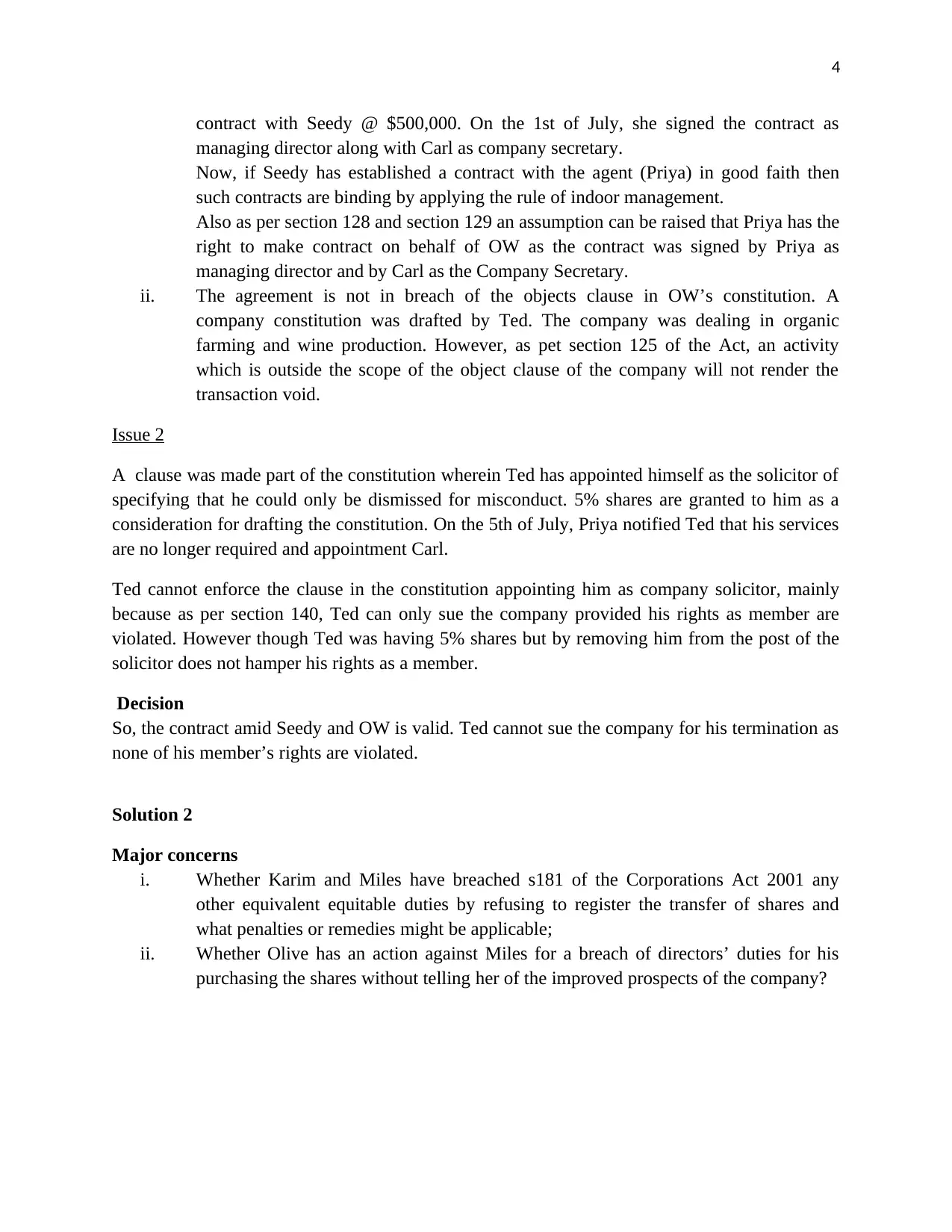
4
contract with Seedy @ $500,000. On the 1st of July, she signed the contract as
managing director along with Carl as company secretary.
Now, if Seedy has established a contract with the agent (Priya) in good faith then
such contracts are binding by applying the rule of indoor management.
Also as per section 128 and section 129 an assumption can be raised that Priya has the
right to make contract on behalf of OW as the contract was signed by Priya as
managing director and by Carl as the Company Secretary.
ii. The agreement is not in breach of the objects clause in OW’s constitution. A
company constitution was drafted by Ted. The company was dealing in organic
farming and wine production. However, as pet section 125 of the Act, an activity
which is outside the scope of the object clause of the company will not render the
transaction void.
Issue 2
A clause was made part of the constitution wherein Ted has appointed himself as the solicitor of
specifying that he could only be dismissed for misconduct. 5% shares are granted to him as a
consideration for drafting the constitution. On the 5th of July, Priya notified Ted that his services
are no longer required and appointment Carl.
Ted cannot enforce the clause in the constitution appointing him as company solicitor, mainly
because as per section 140, Ted can only sue the company provided his rights as member are
violated. However though Ted was having 5% shares but by removing him from the post of the
solicitor does not hamper his rights as a member.
Decision
So, the contract amid Seedy and OW is valid. Ted cannot sue the company for his termination as
none of his member’s rights are violated.
Solution 2
Major concerns
i. Whether Karim and Miles have breached s181 of the Corporations Act 2001 any
other equivalent equitable duties by refusing to register the transfer of shares and
what penalties or remedies might be applicable;
ii. Whether Olive has an action against Miles for a breach of directors’ duties for his
purchasing the shares without telling her of the improved prospects of the company?
contract with Seedy @ $500,000. On the 1st of July, she signed the contract as
managing director along with Carl as company secretary.
Now, if Seedy has established a contract with the agent (Priya) in good faith then
such contracts are binding by applying the rule of indoor management.
Also as per section 128 and section 129 an assumption can be raised that Priya has the
right to make contract on behalf of OW as the contract was signed by Priya as
managing director and by Carl as the Company Secretary.
ii. The agreement is not in breach of the objects clause in OW’s constitution. A
company constitution was drafted by Ted. The company was dealing in organic
farming and wine production. However, as pet section 125 of the Act, an activity
which is outside the scope of the object clause of the company will not render the
transaction void.
Issue 2
A clause was made part of the constitution wherein Ted has appointed himself as the solicitor of
specifying that he could only be dismissed for misconduct. 5% shares are granted to him as a
consideration for drafting the constitution. On the 5th of July, Priya notified Ted that his services
are no longer required and appointment Carl.
Ted cannot enforce the clause in the constitution appointing him as company solicitor, mainly
because as per section 140, Ted can only sue the company provided his rights as member are
violated. However though Ted was having 5% shares but by removing him from the post of the
solicitor does not hamper his rights as a member.
Decision
So, the contract amid Seedy and OW is valid. Ted cannot sue the company for his termination as
none of his member’s rights are violated.
Solution 2
Major concerns
i. Whether Karim and Miles have breached s181 of the Corporations Act 2001 any
other equivalent equitable duties by refusing to register the transfer of shares and
what penalties or remedies might be applicable;
ii. Whether Olive has an action against Miles for a breach of directors’ duties for his
purchasing the shares without telling her of the improved prospects of the company?
Secure Best Marks with AI Grader
Need help grading? Try our AI Grader for instant feedback on your assignments.
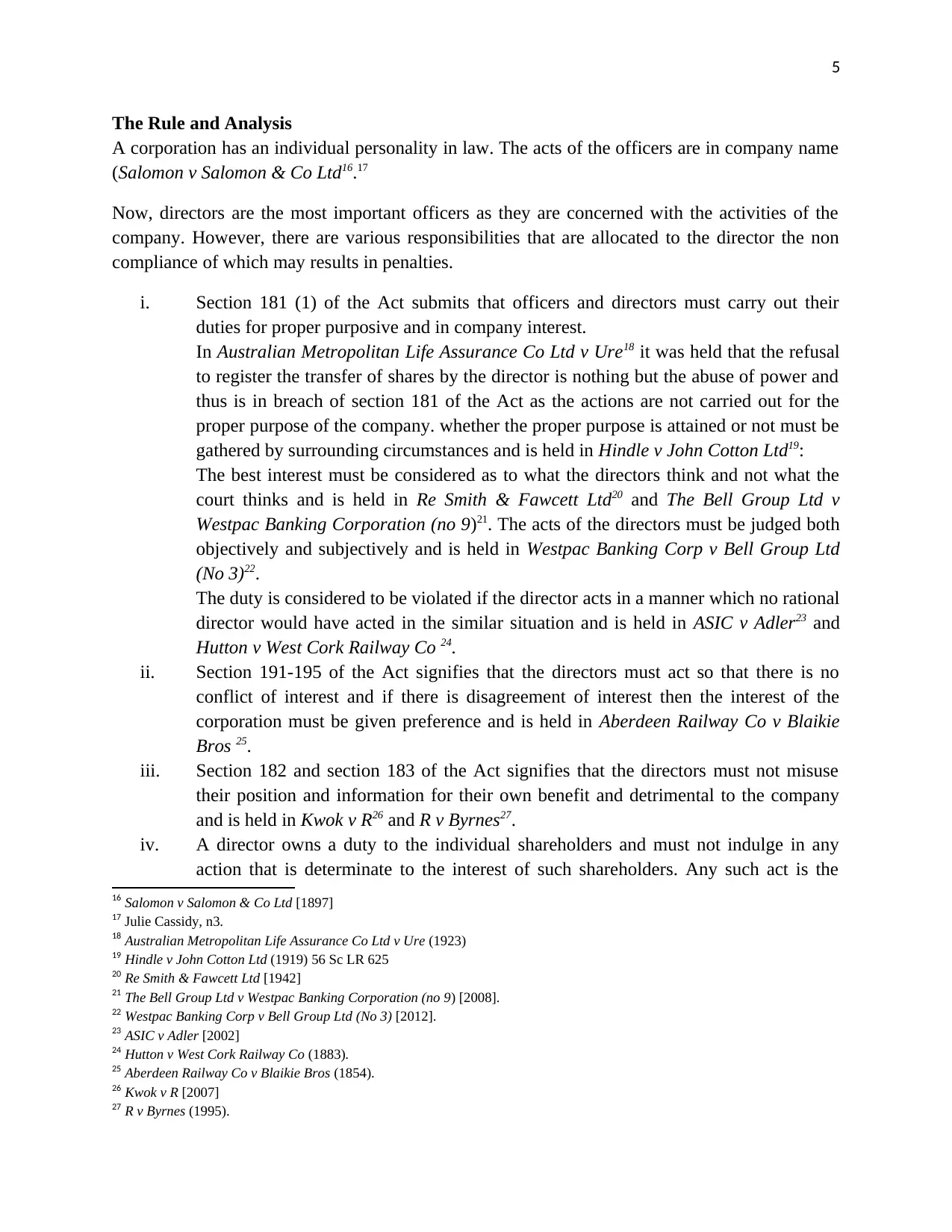
5
The Rule and Analysis
A corporation has an individual personality in law. The acts of the officers are in company name
(Salomon v Salomon & Co Ltd16.17
Now, directors are the most important officers as they are concerned with the activities of the
company. However, there are various responsibilities that are allocated to the director the non
compliance of which may results in penalties.
i. Section 181 (1) of the Act submits that officers and directors must carry out their
duties for proper purposive and in company interest.
In Australian Metropolitan Life Assurance Co Ltd v Ure18 it was held that the refusal
to register the transfer of shares by the director is nothing but the abuse of power and
thus is in breach of section 181 of the Act as the actions are not carried out for the
proper purpose of the company. whether the proper purpose is attained or not must be
gathered by surrounding circumstances and is held in Hindle v John Cotton Ltd19:
The best interest must be considered as to what the directors think and not what the
court thinks and is held in Re Smith & Fawcett Ltd20 and The Bell Group Ltd v
Westpac Banking Corporation (no 9)21. The acts of the directors must be judged both
objectively and subjectively and is held in Westpac Banking Corp v Bell Group Ltd
(No 3)22.
The duty is considered to be violated if the director acts in a manner which no rational
director would have acted in the similar situation and is held in ASIC v Adler23 and
Hutton v West Cork Railway Co 24.
ii. Section 191-195 of the Act signifies that the directors must act so that there is no
conflict of interest and if there is disagreement of interest then the interest of the
corporation must be given preference and is held in Aberdeen Railway Co v Blaikie
Bros 25.
iii. Section 182 and section 183 of the Act signifies that the directors must not misuse
their position and information for their own benefit and detrimental to the company
and is held in Kwok v R26 and R v Byrnes27.
iv. A director owns a duty to the individual shareholders and must not indulge in any
action that is determinate to the interest of such shareholders. Any such act is the
16 Salomon v Salomon & Co Ltd [1897]
17 Julie Cassidy, n3.
18 Australian Metropolitan Life Assurance Co Ltd v Ure (1923)
19 Hindle v John Cotton Ltd (1919) 56 Sc LR 625
20 Re Smith & Fawcett Ltd [1942]
21 The Bell Group Ltd v Westpac Banking Corporation (no 9) [2008].
22 Westpac Banking Corp v Bell Group Ltd (No 3) [2012].
23 ASIC v Adler [2002]
24 Hutton v West Cork Railway Co (1883).
25 Aberdeen Railway Co v Blaikie Bros (1854).
26 Kwok v R [2007]
27 R v Byrnes (1995).
The Rule and Analysis
A corporation has an individual personality in law. The acts of the officers are in company name
(Salomon v Salomon & Co Ltd16.17
Now, directors are the most important officers as they are concerned with the activities of the
company. However, there are various responsibilities that are allocated to the director the non
compliance of which may results in penalties.
i. Section 181 (1) of the Act submits that officers and directors must carry out their
duties for proper purposive and in company interest.
In Australian Metropolitan Life Assurance Co Ltd v Ure18 it was held that the refusal
to register the transfer of shares by the director is nothing but the abuse of power and
thus is in breach of section 181 of the Act as the actions are not carried out for the
proper purpose of the company. whether the proper purpose is attained or not must be
gathered by surrounding circumstances and is held in Hindle v John Cotton Ltd19:
The best interest must be considered as to what the directors think and not what the
court thinks and is held in Re Smith & Fawcett Ltd20 and The Bell Group Ltd v
Westpac Banking Corporation (no 9)21. The acts of the directors must be judged both
objectively and subjectively and is held in Westpac Banking Corp v Bell Group Ltd
(No 3)22.
The duty is considered to be violated if the director acts in a manner which no rational
director would have acted in the similar situation and is held in ASIC v Adler23 and
Hutton v West Cork Railway Co 24.
ii. Section 191-195 of the Act signifies that the directors must act so that there is no
conflict of interest and if there is disagreement of interest then the interest of the
corporation must be given preference and is held in Aberdeen Railway Co v Blaikie
Bros 25.
iii. Section 182 and section 183 of the Act signifies that the directors must not misuse
their position and information for their own benefit and detrimental to the company
and is held in Kwok v R26 and R v Byrnes27.
iv. A director owns a duty to the individual shareholders and must not indulge in any
action that is determinate to the interest of such shareholders. Any such act is the
16 Salomon v Salomon & Co Ltd [1897]
17 Julie Cassidy, n3.
18 Australian Metropolitan Life Assurance Co Ltd v Ure (1923)
19 Hindle v John Cotton Ltd (1919) 56 Sc LR 625
20 Re Smith & Fawcett Ltd [1942]
21 The Bell Group Ltd v Westpac Banking Corporation (no 9) [2008].
22 Westpac Banking Corp v Bell Group Ltd (No 3) [2012].
23 ASIC v Adler [2002]
24 Hutton v West Cork Railway Co (1883).
25 Aberdeen Railway Co v Blaikie Bros (1854).
26 Kwok v R [2007]
27 R v Byrnes (1995).
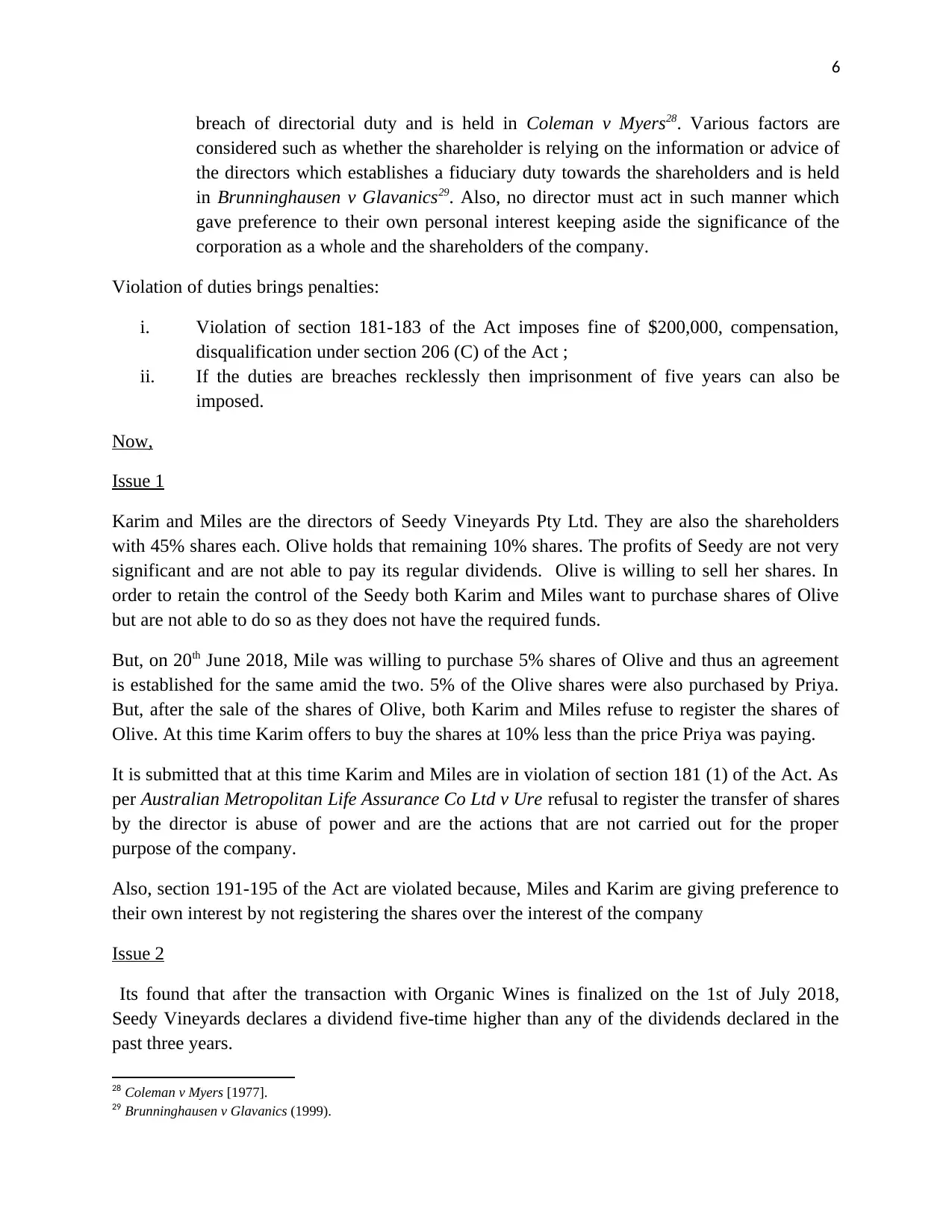
6
breach of directorial duty and is held in Coleman v Myers28. Various factors are
considered such as whether the shareholder is relying on the information or advice of
the directors which establishes a fiduciary duty towards the shareholders and is held
in Brunninghausen v Glavanics29. Also, no director must act in such manner which
gave preference to their own personal interest keeping aside the significance of the
corporation as a whole and the shareholders of the company.
Violation of duties brings penalties:
i. Violation of section 181-183 of the Act imposes fine of $200,000, compensation,
disqualification under section 206 (C) of the Act ;
ii. If the duties are breaches recklessly then imprisonment of five years can also be
imposed.
Now,
Issue 1
Karim and Miles are the directors of Seedy Vineyards Pty Ltd. They are also the shareholders
with 45% shares each. Olive holds that remaining 10% shares. The profits of Seedy are not very
significant and are not able to pay its regular dividends. Olive is willing to sell her shares. In
order to retain the control of the Seedy both Karim and Miles want to purchase shares of Olive
but are not able to do so as they does not have the required funds.
But, on 20th June 2018, Mile was willing to purchase 5% shares of Olive and thus an agreement
is established for the same amid the two. 5% of the Olive shares were also purchased by Priya.
But, after the sale of the shares of Olive, both Karim and Miles refuse to register the shares of
Olive. At this time Karim offers to buy the shares at 10% less than the price Priya was paying.
It is submitted that at this time Karim and Miles are in violation of section 181 (1) of the Act. As
per Australian Metropolitan Life Assurance Co Ltd v Ure refusal to register the transfer of shares
by the director is abuse of power and are the actions that are not carried out for the proper
purpose of the company.
Also, section 191-195 of the Act are violated because, Miles and Karim are giving preference to
their own interest by not registering the shares over the interest of the company
Issue 2
Its found that after the transaction with Organic Wines is finalized on the 1st of July 2018,
Seedy Vineyards declares a dividend five-time higher than any of the dividends declared in the
past three years.
28 Coleman v Myers [1977].
29 Brunninghausen v Glavanics (1999).
breach of directorial duty and is held in Coleman v Myers28. Various factors are
considered such as whether the shareholder is relying on the information or advice of
the directors which establishes a fiduciary duty towards the shareholders and is held
in Brunninghausen v Glavanics29. Also, no director must act in such manner which
gave preference to their own personal interest keeping aside the significance of the
corporation as a whole and the shareholders of the company.
Violation of duties brings penalties:
i. Violation of section 181-183 of the Act imposes fine of $200,000, compensation,
disqualification under section 206 (C) of the Act ;
ii. If the duties are breaches recklessly then imprisonment of five years can also be
imposed.
Now,
Issue 1
Karim and Miles are the directors of Seedy Vineyards Pty Ltd. They are also the shareholders
with 45% shares each. Olive holds that remaining 10% shares. The profits of Seedy are not very
significant and are not able to pay its regular dividends. Olive is willing to sell her shares. In
order to retain the control of the Seedy both Karim and Miles want to purchase shares of Olive
but are not able to do so as they does not have the required funds.
But, on 20th June 2018, Mile was willing to purchase 5% shares of Olive and thus an agreement
is established for the same amid the two. 5% of the Olive shares were also purchased by Priya.
But, after the sale of the shares of Olive, both Karim and Miles refuse to register the shares of
Olive. At this time Karim offers to buy the shares at 10% less than the price Priya was paying.
It is submitted that at this time Karim and Miles are in violation of section 181 (1) of the Act. As
per Australian Metropolitan Life Assurance Co Ltd v Ure refusal to register the transfer of shares
by the director is abuse of power and are the actions that are not carried out for the proper
purpose of the company.
Also, section 191-195 of the Act are violated because, Miles and Karim are giving preference to
their own interest by not registering the shares over the interest of the company
Issue 2
Its found that after the transaction with Organic Wines is finalized on the 1st of July 2018,
Seedy Vineyards declares a dividend five-time higher than any of the dividends declared in the
past three years.
28 Coleman v Myers [1977].
29 Brunninghausen v Glavanics (1999).
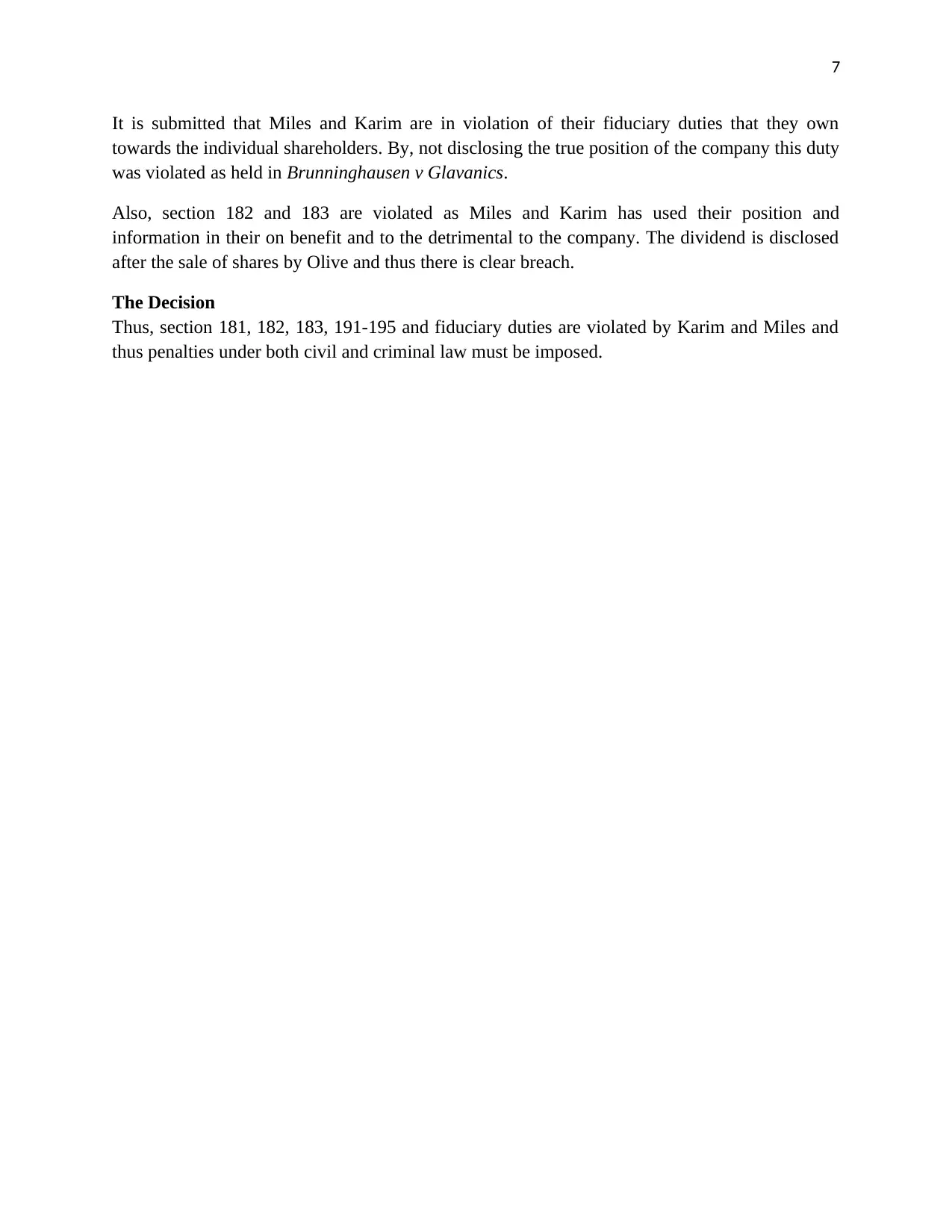
7
It is submitted that Miles and Karim are in violation of their fiduciary duties that they own
towards the individual shareholders. By, not disclosing the true position of the company this duty
was violated as held in Brunninghausen v Glavanics.
Also, section 182 and 183 are violated as Miles and Karim has used their position and
information in their on benefit and to the detrimental to the company. The dividend is disclosed
after the sale of shares by Olive and thus there is clear breach.
The Decision
Thus, section 181, 182, 183, 191-195 and fiduciary duties are violated by Karim and Miles and
thus penalties under both civil and criminal law must be imposed.
It is submitted that Miles and Karim are in violation of their fiduciary duties that they own
towards the individual shareholders. By, not disclosing the true position of the company this duty
was violated as held in Brunninghausen v Glavanics.
Also, section 182 and 183 are violated as Miles and Karim has used their position and
information in their on benefit and to the detrimental to the company. The dividend is disclosed
after the sale of shares by Olive and thus there is clear breach.
The Decision
Thus, section 181, 182, 183, 191-195 and fiduciary duties are violated by Karim and Miles and
thus penalties under both civil and criminal law must be imposed.
Paraphrase This Document
Need a fresh take? Get an instant paraphrase of this document with our AI Paraphraser
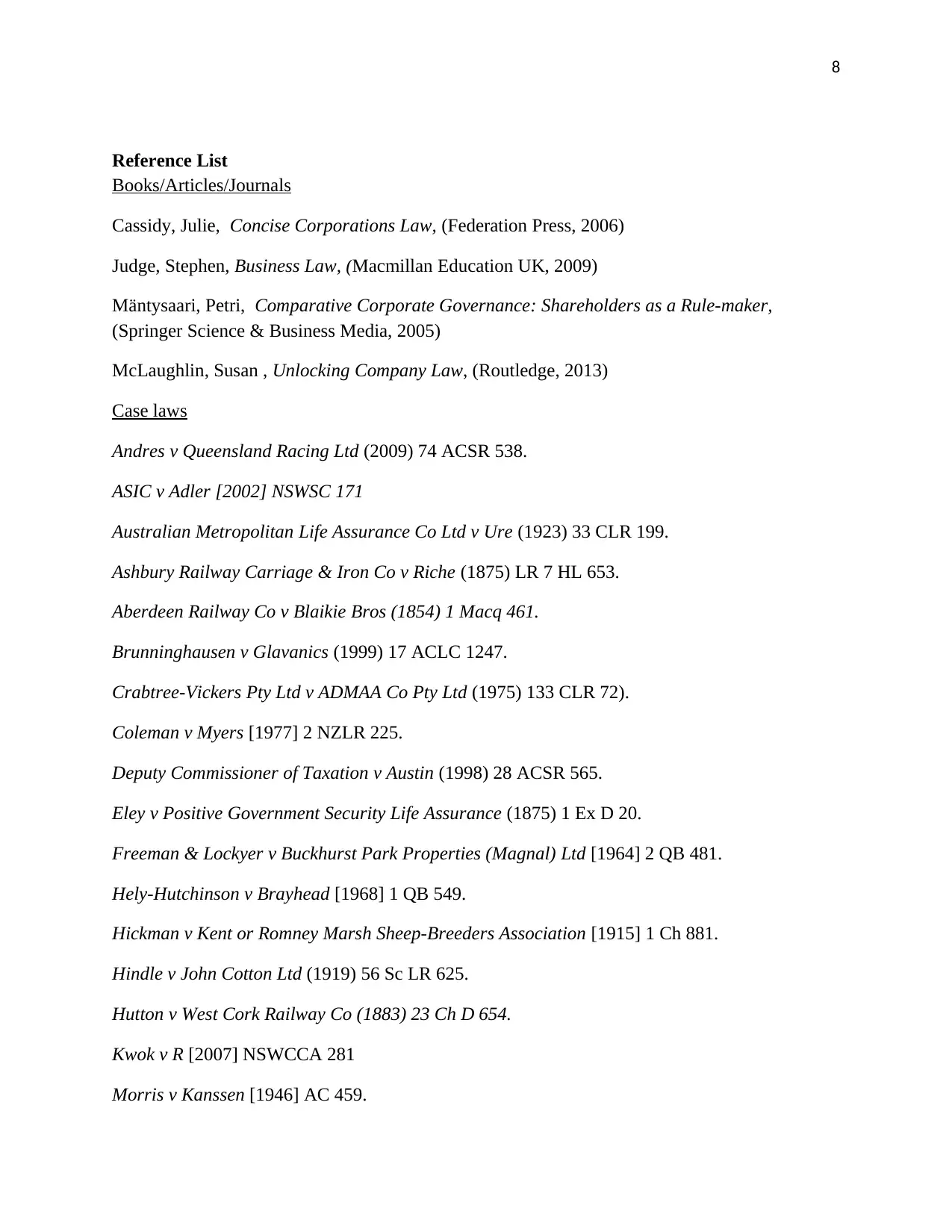
8
Reference List
Books/Articles/Journals
Cassidy, Julie, Concise Corporations Law, (Federation Press, 2006)
Judge, Stephen, Business Law, (Macmillan Education UK, 2009)
Mäntysaari, Petri, Comparative Corporate Governance: Shareholders as a Rule-maker,
(Springer Science & Business Media, 2005)
McLaughlin, Susan , Unlocking Company Law, (Routledge, 2013)
Case laws
Andres v Queensland Racing Ltd (2009) 74 ACSR 538.
ASIC v Adler [2002] NSWSC 171
Australian Metropolitan Life Assurance Co Ltd v Ure (1923) 33 CLR 199.
Ashbury Railway Carriage & Iron Co v Riche (1875) LR 7 HL 653.
Aberdeen Railway Co v Blaikie Bros (1854) 1 Macq 461.
Brunninghausen v Glavanics (1999) 17 ACLC 1247.
Crabtree-Vickers Pty Ltd v ADMAA Co Pty Ltd (1975) 133 CLR 72).
Coleman v Myers [1977] 2 NZLR 225.
Deputy Commissioner of Taxation v Austin (1998) 28 ACSR 565.
Eley v Positive Government Security Life Assurance (1875) 1 Ex D 20.
Freeman & Lockyer v Buckhurst Park Properties (Magnal) Ltd [1964] 2 QB 481.
Hely-Hutchinson v Brayhead [1968] 1 QB 549.
Hickman v Kent or Romney Marsh Sheep-Breeders Association [1915] 1 Ch 881.
Hindle v John Cotton Ltd (1919) 56 Sc LR 625.
Hutton v West Cork Railway Co (1883) 23 Ch D 654.
Kwok v R [2007] NSWCCA 281
Morris v Kanssen [1946] AC 459.
Reference List
Books/Articles/Journals
Cassidy, Julie, Concise Corporations Law, (Federation Press, 2006)
Judge, Stephen, Business Law, (Macmillan Education UK, 2009)
Mäntysaari, Petri, Comparative Corporate Governance: Shareholders as a Rule-maker,
(Springer Science & Business Media, 2005)
McLaughlin, Susan , Unlocking Company Law, (Routledge, 2013)
Case laws
Andres v Queensland Racing Ltd (2009) 74 ACSR 538.
ASIC v Adler [2002] NSWSC 171
Australian Metropolitan Life Assurance Co Ltd v Ure (1923) 33 CLR 199.
Ashbury Railway Carriage & Iron Co v Riche (1875) LR 7 HL 653.
Aberdeen Railway Co v Blaikie Bros (1854) 1 Macq 461.
Brunninghausen v Glavanics (1999) 17 ACLC 1247.
Crabtree-Vickers Pty Ltd v ADMAA Co Pty Ltd (1975) 133 CLR 72).
Coleman v Myers [1977] 2 NZLR 225.
Deputy Commissioner of Taxation v Austin (1998) 28 ACSR 565.
Eley v Positive Government Security Life Assurance (1875) 1 Ex D 20.
Freeman & Lockyer v Buckhurst Park Properties (Magnal) Ltd [1964] 2 QB 481.
Hely-Hutchinson v Brayhead [1968] 1 QB 549.
Hickman v Kent or Romney Marsh Sheep-Breeders Association [1915] 1 Ch 881.
Hindle v John Cotton Ltd (1919) 56 Sc LR 625.
Hutton v West Cork Railway Co (1883) 23 Ch D 654.
Kwok v R [2007] NSWCCA 281
Morris v Kanssen [1946] AC 459.
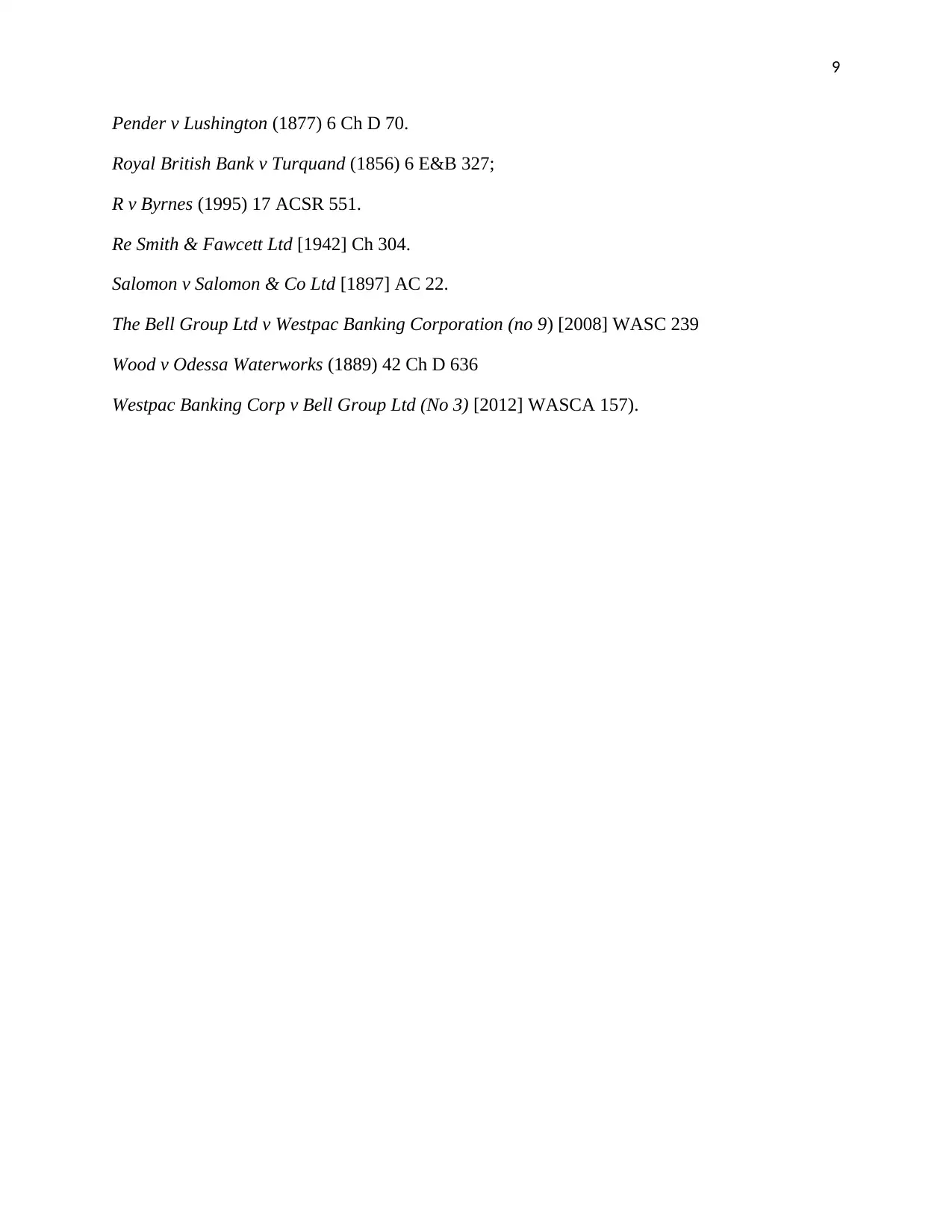
9
Pender v Lushington (1877) 6 Ch D 70.
Royal British Bank v Turquand (1856) 6 E&B 327;
R v Byrnes (1995) 17 ACSR 551.
Re Smith & Fawcett Ltd [1942] Ch 304.
Salomon v Salomon & Co Ltd [1897] AC 22.
The Bell Group Ltd v Westpac Banking Corporation (no 9) [2008] WASC 239
Wood v Odessa Waterworks (1889) 42 Ch D 636
Westpac Banking Corp v Bell Group Ltd (No 3) [2012] WASCA 157).
Pender v Lushington (1877) 6 Ch D 70.
Royal British Bank v Turquand (1856) 6 E&B 327;
R v Byrnes (1995) 17 ACSR 551.
Re Smith & Fawcett Ltd [1942] Ch 304.
Salomon v Salomon & Co Ltd [1897] AC 22.
The Bell Group Ltd v Westpac Banking Corporation (no 9) [2008] WASC 239
Wood v Odessa Waterworks (1889) 42 Ch D 636
Westpac Banking Corp v Bell Group Ltd (No 3) [2012] WASCA 157).
1 out of 9
Related Documents
Your All-in-One AI-Powered Toolkit for Academic Success.
+13062052269
info@desklib.com
Available 24*7 on WhatsApp / Email
![[object Object]](/_next/static/media/star-bottom.7253800d.svg)
Unlock your academic potential
© 2024 | Zucol Services PVT LTD | All rights reserved.





